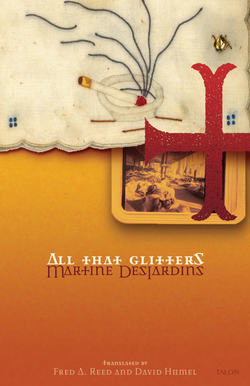Читать книгу All That Glitters - Martine Desjardins - Страница 13
На сайте Литреса книга снята с продажи.
ОглавлениеVII
NOT A SOUND could be heard in the ranks, only the crunch of boots over the stubble. I marched straight ahead in time to the rhythmic slapping of the bayonet against my thigh, making short work of the obstacles in the terrain which would suddenly loom out of the fog. At dawn we had been given the order to lead three platoons up to the front lines, and now we were but a few miles from the zone where the great armies were locked in combat. The bell that signalled my baptism of fire had begun to toll.
Suddenly I snapped my head to one side. Something had whistled by, grazing my temple.
“Not to worry,” said Lieutenant Peakes. “Just a stray bullet. If it had hit you, you wouldn’t have heard a thing.”
I ran my fingers through my scorched hair. Men stepped aside as I passed. I could hear them speaking softly behind me. Like the lieutenant, I now wore the halo of prestige. From then on, I would be known as the one who had been singed by death’s wing. Still, I would have appreciated it had he left me with a scar, no matter how tiny.
As we emerged from a wooded area, Peakes silently mustered the men into a single line. Before us lay the entrance to the entrenchments, like a grave dug deep into the earth. There, only the most alive of the living could enter, the bravest of the brave. I rolled a die between my fingers, breathed on it and urged myself forward.
The scene was one of confusion. The footpath itself was strewn with logs and rusting metal plates; the walls were half-collapsed. Dead-ends and bypasses that circled around to their starting point punctuated its twisting course. The lieutenant lifted his nose and sniffed, like a dog seeking a trail.
“Can you smell it, Dulac?”
“What?”
“The fragrance of iron. Follow your nose.”
Before long we reached the support lines where the gunners were busy setting up their trench mortars, then a squad of sappers laying duck board. Beyond the entrance to a communications trench we came upon a five-point junction of radiating trenches. Peakes took me aside.
“I can go no farther. There is so much metal around that it has upset my compass.”
“With your permission, lieutenant … ”
I cast a die onto the floor of the trench. It came up three. I pointed out the third branch to Peakes. He allowed me to take the lead.
“Go ahead. It’s your throw.”
We made our way forward, consulting the die when in doubt. Finally, an hour later, we reached the front lines. We had successfully completed the trial of the labyrinth: an excellent beginning.
The front looked nothing like the great battlefield I had imagined. At most, it was the point of friction between two adversaries of equal strength who, in the course of their unrelenting struggle, had so trampled the earth that it had finally swallowed them up. Over the months, the first fissures had lengthened, and now the embroidery of interconnecting trenches stretched for mile upon mile without interruption. It was said that a man could travel through them from the Swiss border to the North Sea without ever raising his head above ground level.
Between the two fires lay no-man’s-land—the “Devil’s half-acre” into which men would venture from time to time to grapple in close combat. For the moment, the war zone was calm. The River Lys, which runs nearby, had overflowed its banks and flooded the land, making contact impossible. But shots continued to ring out from both sides. We’d been issued strict orders to keep our heads down day and night—apparently the German snipers could see even in the dark.
I first beheld the panorama through the lens of a periscope. Crouched in the observation dugout, I scanned the horizon for the pointed helmets, the machine guns, the trench mortars. Not a sign of the enemy was to be seen. But I knew he was there, burrowed deep beneath the surface, crawling through the entrails of the earth. And with each of his movements, I could hear the tinkle of the Rhinegold he’d brought with him.
Meanwhile, all Peakes could see was iron.
“Look at those coils of barbed wire, will you, those piles of shell casings, those lattice-work barriers … It’s like a park of iron.”
A curious description. A park, indeed! More like a forsaken landscape strewn with broken bayonets. The only pool to be seen was a shell crater surrounded by four chevaux-de-frise brimming with filthy water. I could not decide whether a corpse propped nonchalantly against a heap of bullet-riddled mess kits might properly be called a statue.
“All these heaps of metal—don’t they strike you as a tremendous waste of hardware?”
“It is the price of victory, Dulac. The price of victory. Never forget Wellington’s words: ‘On the battlefield, one needs a ton of iron to kill one man.’ Clearly, it would take more than that to kill you.”
